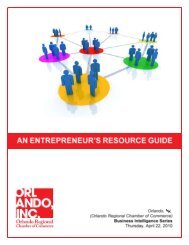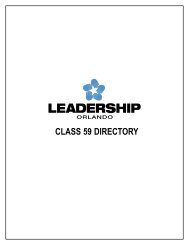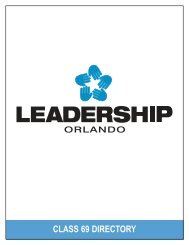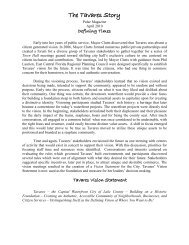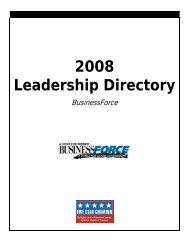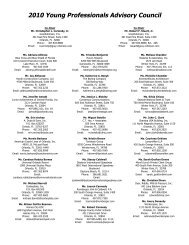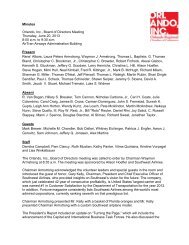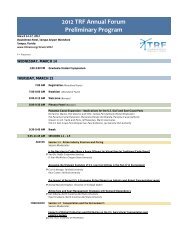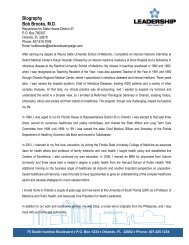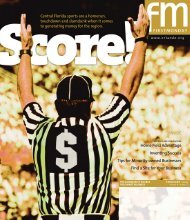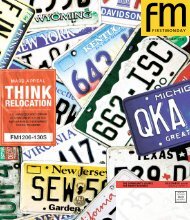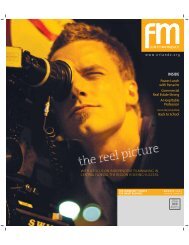FM Oct 04 PDF - Orlando Chamber of Commerce
FM Oct 04 PDF - Orlando Chamber of Commerce
FM Oct 04 PDF - Orlando Chamber of Commerce
You also want an ePaper? Increase the reach of your titles
YUMPU automatically turns print PDFs into web optimized ePapers that Google loves.
Red Flags<br />
The Top 10 blunders to look for when weeding through resumés.<br />
By Luis Ferrer, President, Florida Employer Solutions<br />
Sometimes knowing what should not be on a<br />
resumé is just as important as knowing what should<br />
be included.<br />
Managers <strong>of</strong> small businesses must be careful<br />
when making the commitment to hire a new<br />
employee. Too <strong>of</strong>ten, resumés are inundated with<br />
superfluous information, and some recruiters say this<br />
leads to settling for a less than qualified candidate just<br />
because it’s easy. This hasty decision, in turn, can lead<br />
to costly mismatches.<br />
Recruiting managers from several industries<br />
suggest watching out for these frequent mistakes to<br />
avoid the expenses <strong>of</strong> employee turnover:<br />
■ “Jack-<strong>of</strong>-all-trades” resumé — Like the saying<br />
goes, ”When you appeal to everyone, you appeal to no<br />
one.” While versatility and a diversified background<br />
are desirable traits, an applicant without a focused<br />
objective does not help fill a specific position.<br />
■ Revealing personal information — It’s<br />
surprising how <strong>of</strong>ten family and hobbies appear on<br />
a resumé. People tend to think <strong>of</strong> a resumé as an<br />
autobiography and include things irrelevant to their<br />
job qualifications. Make sure that every item is<br />
pertinent to the position.<br />
■ Being generic — Look for specifics when reviewing<br />
pr<strong>of</strong>essional accomplishments. Instead <strong>of</strong> being vague<br />
with “Increased sales volume,” an applicant should<br />
assert, “Increased product sales volume by five percent<br />
over an 11-month period.”<br />
■ Political views/sensitive subjects — Be conscientious<br />
<strong>of</strong> a prospective employee telling too much before<br />
an interview. Although applicants may include personal<br />
views such as involvement in political affiliations, make<br />
sure that they aren’t pre-judged based on their beliefs.<br />
■ Use <strong>of</strong> clichés — What does the phrase “I’m a people<br />
person” tell someone about an applicant? Nothing.<br />
Using clichés is vague and gives no indication that the<br />
applicant meets the qualifications. Instead, gauge the<br />
time they took to research the industry by their use <strong>of</strong><br />
industry jargon and “buzz” words.<br />
■ Too much information — A resumé is the tip <strong>of</strong><br />
the iceberg, not an account <strong>of</strong> an entire lifetime’s work.<br />
The word “resumé” means a brief summary <strong>of</strong> work<br />
experience and qualifications. While there is no<br />
standard resumé length, it should highlight a<br />
particular facet <strong>of</strong> one’s career.<br />
■ Fluffy objectives — Chances are, you’ve read this<br />
objective before: “Highly motivated team player with<br />
excellent organizational and communication skills.”<br />
An objective needs to be tailored to the position, not a<br />
standard phrase plucked from a how-to resumé book.<br />
■ Plain carelessness — Grammatical and spelling<br />
errors are the number-one mistake made on resumés,<br />
even at the senior level. A resumé addressed to the<br />
wrong person or containing inaccurate contact<br />
information translates to an employee who doesn’t<br />
pay attention to detail.<br />
By watching for these red flags,<br />
management can <strong>of</strong>ten avoid<br />
ill-advised hirings and have a better<br />
track record when hiring “the right<br />
person” for a particular job.<br />
■ Fancy colors and fonts — Since many<br />
organizations scan resumés and place them into<br />
a database, many fancy fonts, layouts and colors<br />
are lost in translation when sent electronically. It’s<br />
helpful for companies to solicit a plain text document<br />
from applicants.<br />
■ Reasons for leaving past jobs — Although<br />
interesting, this should be left out <strong>of</strong> a resumé and<br />
best addressed in the interview.<br />
A job candidate doesn’t have to produce the<br />
perfect resume in order to be a good employee,<br />
but by watching for these red flags, management<br />
can <strong>of</strong>ten avoid ill-advised hirings and have a better<br />
track record when hiring “the right person” for a<br />
particular job.<br />
<strong>FM</strong> OCTOBER 20<strong>04</strong> 9



